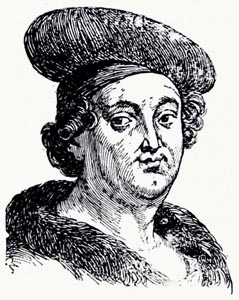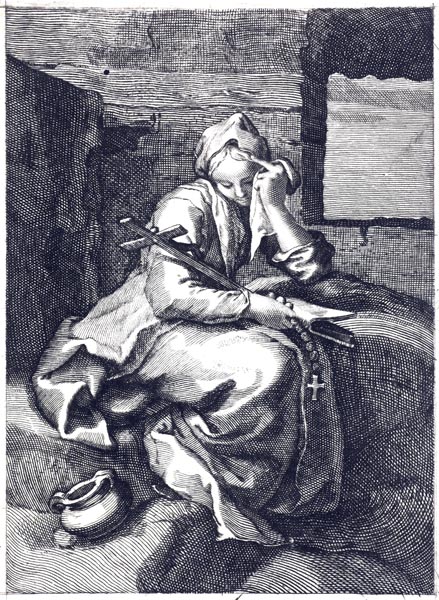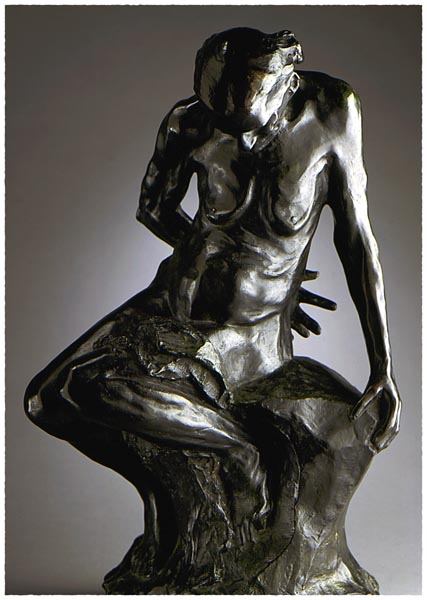François Villon
Poems

‘François Villon’
Library of the World's Best Literature, Ancient and Modern (p329, 1902)
Charles Dudley Warner (1829-1900), Hamilton Wright Mabie (1846-1916) and Lucia Isabella (Gilbert) Runkle (1844-)
Internet Archive Book Images
Translated by A. S. Kline © Copyright 2004 All Rights Reserved
This work may be freely reproduced, stored and transmitted, electronically or otherwise, for any non-commercial purpose. Conditions and Exceptions apply.
Contents
- Le Testament: Ballade Des Dames Du Temps Jadis
- Le Testament: Les Regrets De La Belle Heaulmière
- Le Testament: Ballade: ‘Item: Donne A Ma Povre Mere’
- Le Testament: Ballade: A S’amye
- Le Testament: Ballade: Pour Robert d’Estouteville
- Le Testament: Rondeau
- Le Testament: Epitaph et Rondeau
- Ballade: Du Concours De Blois
- Ballade: Epistre
- L’Epitaphe Villon: Ballade Des Pendus
- Index of First Lines
Le Testament: Ballade Des Dames Du Temps Jadis
Tell me where, or in what country
Is Flora, the lovely Roman,
Archipiades or Thaïs,
Who was her nearest cousin,
Echo answering, at clap of hand,
Over the river, and the meadow,
Whose beauty was more than human?
Oh, where is last year’s snow?
Where is that wise girl Eloise,
For whom was gelded, to his great shame,
Peter Abelard, at Saint Denis,
For love of her enduring pain,
And where now is that queen again,
Who commanded them to throw
Buridan in a sack, in the Seine?
Oh, where is last year’s snow?
Queen Blanche of the Siren’s voice
White as a swan, and Alice, say,
Bertha Big-Foot and Beatrice,
Arembourg, ruler of Maine,
Or Jeanne d’Arc of Lorraine,
The English burned at Rouen? Oh,
Where are they Virgin, you who reign?
Oh, where is last year’s snow?
Prince, don’t ask of me again
Where they are, this year or no,
I have only this last refrain:
Oh, where is last year’s snow?
Note: Dante Gabriel Rossetti took Archipiades to be Hipparchia (see Diogenes Laertius, Lives of the Philosophers, Book VI 96-98) who loved Crates the Theban Cynic philosopher (368/5-288/5BC) and of whom various tales are told suggesting her beauty, and independence of mind. This would make her an exact or close contemporary of Thais, beautiful Athenian courtesan and mistress of Alexander the Great (356-323BC). Villon presumably means that they were ‘near cousins’ in spirit.

‘Saint Thaïs of Alexandria’
Boëtius Adamsz. Bolswert, Abraham Bloemaert, Anonymous, 1590 - 1662
The Rijksmuseum
Le Testament: Les Regrets De La Belle Heaulmière
By chance, I heard the belle complain,
The one we called the Armouress,
Longing to be a girl again,
Talking like this, more or less:
‘Oh, old age, proud in wickedness,
You’ve battered me so, and why?
Who cares, who, for my distress,
Or whether at all your blows I die?
You’ve stolen away that great power
My beauty ordained for me
Over priests and clerks, my hour,
When never a man I’d see
Would fail to offer his all in fee,
Whatever remorse he’d later show,
But what was abandoned readily,
Beggars now scorn to know.
Many a man I then refused –
Which wasn’t wise of me, no jest –
For love of a boy, cunning too,
To whom I gave all my largesse.
I feigned to him unwillingness,
But, by my soul, I loved him bad.
What he showed was his roughness,
Loving me only for what I had.
He could drag me through the dirt,
Trample me underfoot, I’d love him,
Break my back, whatever’s worse,
If only he’d ask for a kiss again,
I’d soon forget then every pain.
A glutton, full of what he could win,
He’d embrace me – with him I’ve lain.
What’s he left me? Shame and sin.
Now he’s dead, these thirty years:
And I live on, old, and grey.
When I think of those times, with tears,
What I was, what I am today,
View myself naked: turn at bay,
Seeing what I am no longer,
Poor, dry, meagre, worn away,
I almost forget myself in anger.
Where’s my smooth brow gone:
My arching lashes, yellow hair,
Wide-eyed glances, pretty ones,
That took in the cleverest there:
Nose not too big or small: a pair
Of delicate little ears, the chin
Dimpled: a face oval and fair,
Lovely lips with crimson skin?
The fine slender shoulder-blades:
The long arms, with tapering hands:
My small breasts: the hips well made
Full and firm, and sweetly planned,
All Love’s tournaments to withstand:
The broad flanks: the nest of hair,
With plump thighs firmly spanned,
Inside its little garden there?
Now wrinkled forehead, hair gone grey:
Sparse eyelashes: eyes so dim,
That laughed and flashed once every way,
And reeled their roaming victims in:
Nose bent from beauty, ears thin,
Hanging down like moss, a face,
Pallid, dead and bleak, the chin
Furrowed, a skinny-lipped disgrace.
This is the end of human beauty:
Shrivelled arms, hands warped like feet:
The shoulders hunched up utterly:
Breasts….what? In full retreat,
Same with the hips, as with the teats:
Little nest, hah! See the thighs,
Not thighs, thighbones, poor man’s meat,
Blotched like sausages, and dried.

‘She Who Was the Helmet-Maker's Beautiful Wife’
Auguste Rodin (France, 1840 - 1917)
LACMA Collections
That’s how the bon temps we regret
Among us, poor old idiots,
Squatting on our haunches, set
All in a heap like woollen lots
Round a hemp fire men forgot,
Soon kindled, and soon dust,
Once so lovely, that cocotte…
So it goes for all of us.
Le Testament: Ballade: ‘Item: Donne A Ma Povre Mere’
Item
This I give to my poor mother
As a prayer now, to our Mistress
– She who bore bitter pain for me,
God knows, and also much sadness –
I’ve no other castle or fortress,
That my body and soul can summon,
When I’m faced with life’s distress,
Nor has my mother, poor woman:
Ballade
‘Lady of Heaven, earthly queen,
Empress of the infernal regions,
Receive me, a humble Christian,
To live among the chosen ones,
Though I’m worth less than anyone.
Your grace, my Lady and Mistress
Is greater than my sinfulness,
Grace without which, I tell no lie,
None deserve their blessedness.
In this faith let me live and die.
Say to your Son that I am His.
Through Him all my sins are lost:
Forgive me, as Mary Egypt was,
Or, so they say, Theophilus,
Who by your grace was still blameless,
Though he vowed the Devil a guest.
Protect me always from like excess,
Virgin, who bore, without a cry,
Christ whom we celebrate at Mass.
In this faith let me live and die.
I am a woman, poor and old,
I can neither read nor spell.
At Mass in church, here, I behold,
A painted Heaven, with harps: a Hell,
Where the damned are boiled, as well.
One gives me joy: one strikes me cold,
Grant me the joy, Great Goddess,
On whom all sinners must rely,
Fill me with faith and no slackness.
In this faith let me live and die.
V irgin, you bore, O High Princess,
I ssue, whose kingdom is endless,
L ord, who took on a littleness
L ike ours: to save us left the sky,
O ffering his lovely youth to death.
N ow, such is our Lord: such we confess:
In this faith let me live and die.
Le Testament: Ballade: A S’amye
F alse beauty that costs me so dear,
R ough indeed, a hypocrite sweetness,
A mor, like iron on the teeth and harder,
N amed only to achieve my sure distress,
C harm that’s murderous, poor heart’s death,
O covert pride that sends men to ruin,
I mplacable eyes, won’t true redress
S uccour a poor man, without crushing?
M uch better elsewhere to search for
A id: it would have been more to my honour:
R etreat I must, and fly with dishonour,
T hough none else then would have cast a lure.
H elp me, help me, you greater and lesser!
E nd then? With not even one blow landing?
Or will Pity, in line with all I ask here,
Succour a poor man, without crushing?
That time will come that will surely wither
Your bright flower, it will wilt and yellow,
Then if I can grin, I’ll call on laughter,
But, yet, that would be foolish though:
You’ll be pale and ugly: and I’ll be old,
Drink deep then, while the stream’s still flowing:
And don’t bring trouble on all men so,
Succour a poor man, without crushing.
Amorous Prince, the greatest lover,
I want no evil that’s of your doing,
But, by God, all noble hearts must offer
To succour a poor man, without crushing.
Le Testament: Ballade: Pour Robert d’Estouteville
A t dawn of day, when falcon shakes his wing,
M ainly from pleasure, and from noble usage,
B lackbirds too shake theirs then as they sing,
R eceiving their mates, mingling their plumage,
O, as the desires it lights in me now rage,
I ’d offer you, joyously, what befits the lover.
S ee how Love has written this very page:
E ven for this end are we come together.
D oubtless, as my heart’s lady you’ll have being,
E ntirely now, till death consumes my age.
L aurel, so sweet, for my cause now fighting,
O live, so noble, removing all bitter foliage,
R eason does not wish me unused to owing,
E ven as I’m to agree with this wish, forever,
Duty to you, but rather grow used to serving:
Even for this end are we come together.
And, what’s more, when sorrow’s beating
Down on me, through Fate’s incessant rage,
Your sweet glance its malice is assuaging,
Nor more or less than wind blows smoke away.
As, in your field, I plant I lose no grain,
For the harvest resembles me, and ever
God orders me to plough, and sow again:
Even for this end are we come together.
Princess, listen to this I now maintain:
That my heart and yours will not dissever:
So much I presume of you, and claim:
Even for this end are we come together.
Note: The ballade was written for Robert to present to his wife Ambroise de Loré, as though composed by him.
Le Testament: Rondeau
Death, I cry out at your harshness,
That stole my girl away from me,
Yet you’re not satisfied I see
Until I languish in distress.
Since then I’ve lost all liveliness:
What harm alive, to you, was she?
Death, I cry out at your harshness,
That stole my girl away from me.
Two we were, with one heart blessed:
If heart’s dead, yes, then I foresee,
I’ll die, or I must lifeless be,
Like those statues made of lead.
Le Testament: Epitaph et Rondeau
Epitaph
Here there lies, and sleeps in the grave,
One whom Love killed with his scorn,
A poor little scholar in every way,
He was named François Villon.
He never reaped a morsel of corn:
Willed all away, as all men know:
Bed, table, and basket all are gone.
Gallants, now sing his song below:
Rondeau
Oh, grant him now eternal peace,
Lord, and everlasting light,
He wasn’t worth a candle bright,
Nor even a sprig of parsley.
Of eyebrows, hair, and beard he’s free,
A turnip scraped with a spade, all right:
Oh, grant him now eternal peace.
Exiled with strict severity,
Rapped behind with a spade, despite
It all he cried: ‘Appeal, for me!’
–Which wasn’t the height of subtlety.
Oh, grant him now eternal peace.
Ballade: Du Concours De Blois
I’m dying of thirst beside the fountain,
Hot as fire, and with chattering teeth:
In my own land, I’m in a far domain:
Near the flame, I shiver beyond belief:
Bare as a worm, dressed in a furry sheathe,
I smile in tears, wait without expectation:
Taking my comfort in sad desperation:
I rejoice, without pleasures, never a one:
Strong I am, without power or persuasion,
Welcomed gladly, and spurned by everyone.
Nothing is sure for me but what’s uncertain:
Obscure, whatever is plainly clear to see:
I’ve no doubt, except of everything certain:
Science is what happens accidentally:
I win it all, yet a loser I’m bound to be:
Saying: ‘God give you good even!’ at dawn,
I greatly fear I’m falling, when lying down:
I’ve plenty, yet I’ve not one possession,
I wait to inherit, yet I’m no heir I own,
Welcomed gladly, and spurned by everyone.
I never take care, yet I’ve taken great pain
To acquire some goods, but have none by me:
Who’s nice to me is one I hate: it’s plain,
And who speaks truth deals with me most falsely:
He’s my friend who can make me believe
A white swan is the blackest crow I’ve known:
Who thinks he’s power to help me, does me harm:
Lies, truth, to me are all one under the sun:
I remember all, have the wisdom of a stone,
Welcomed gladly, and spurned by everyone.
Merciful Prince, may it please you that I’ve shown
There’s much I know, yet without sense or reason:
I’m partial, yet I hold with all men, in common.
What more can I do? Redeem what I’ve in pawn,
Welcomed gladly, and spurned by everyone.
Ballade: Epistre
Have pity now, have pity now on me,
If you at least would, friends of mine.
I’m in the depths, not holly or may,
In exile, where I’ve been consigned
By Fortune, as God too has designed.
Girls, lovers, youngsters, fresh to hand,
Dancers, tumblers that leap like lambs,
Agile as arrows, like shots from a cannon,
Throats tinkling, clear as bells on rams,
Will you leave him here, your poor old Villon?
Singers, singing in lawless freedom,
Jokers, pleasant in word and deed,
Run free of false gold, alloy, come,
Men of wit – somewhat deaf indeed –
Hurry, be quick now, he’s dying poor man.
Makers of lays, motets and rondeaux,
Will you bring him warmth when he’s down below?
No lightning or storm reach where he’s gone.
With these thick walls they’ve blinded him so.
Will you leave him here, your poor old Villon?
Come see him here, in his piteous plight,
Noblemen, free of tax and tithe,
Holding nothing by king or emperor’s right,
But by grace of the God of Paradise.
Sundays and Tuesdays he fasts and sighs,
His teeth are as sharp as the rats’ below,
After dry bread, and no gateaux,
Water for soup that floats his guts along.
With no table or chair, he’s lying low.
Will you leave him here, your poor old Villon?
Princes of note, old, new, don’t fail:
Beg the king’s pardon for me, and seal,
And a basket to raise me, I’ll sit upon:
So pigs behave, to each other, they say,
When one pig squeals, all rush that way.
Will you leave him here, your poor old Villon?
L’Epitaphe Villon: Ballade Des Pendus
My brothers who live after us,
Don’t harden you hearts against us too,
If you have mercy now on us,
God may have mercy upon you.
Five, six, you see us, hung out to view.
When the flesh that nourished us well
Is eaten piecemeal, ah, see it swell,
And we, the bones, are dust and gall,
Let no one make fun of our ill,
But pray that God absolves us all.
No need, if we cry out to you, brothers,
To show disdain, if we’re in suspense
For justice’s sake. How few of the others,
Are men equipped with common sense.
Pray for us, now beyond violence,
To the Son of the Virgin Mary,
So of grace to us she’s not chary,
Shields us from Hell’s lightning fall.
We’re dead: the souls let no man harry,
But pray that God absolves us all.
The rain has soaked us, washed us: skies
Of hot suns blacken us, scorch us: crows
And magpies have gouged out our eyes,
Plucked at our beards, and our eyebrows.
There’s never a moment’s rest allowed:
Now here, now there, the changing breeze
Swings us, as it wishes, ceaselessly,
Beaks pricking us more than a cobbler’s awl.
So don’t you join our fraternity,
But pray that God absolves us all.
Prince Jesus, who has all sovereignty,
Preserve us from Hell’s mastery.
We’ve no business down there at all.
Men, you’ve no time for mockery.
But pray to God to absolve us all.
Index of First Lines
- Tell me where, or in what country
- By chance, I heard the belle complain,
- This I give to my poor mother
- F alse beauty that costs me so dear,
- A t dawn of day, when the falcon shakes his wing,
- Death, I cry out at your harshness,
- Here there lies, and sleeps in the grave,
- I’m dying of thirst beside the fountain,
- Have pity now, have pity now on me,
- My brothers who live after us,